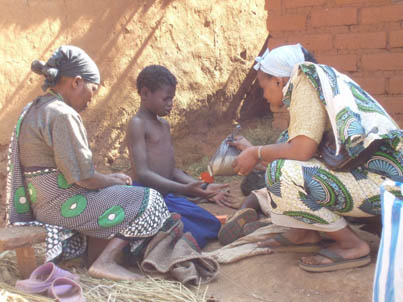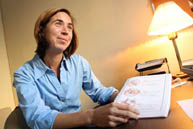A ray of hope
School of Nursing fellow returns from Tanzania

Betty Liduke, right, McGill School of Nursing's proposed first International Clinical Instructor in Africa, gives sugar to an HIV-positive girl who was orphaned by AIDS.
CHRISTINA CLAUSEN
Across the airplane aisle from Christina Clausen a passenger was having difficulty breathing. The flight attendant's piped-in voice requested help. Instantly, half a dozen medical professionals stood. Paramedics were waiting when the plane landed at Pierre Elliott Trudeau International Airport. Everything worked out for the ailing man but the incident stunned Clausen, who'd already been pondering the stark differences in health-care access in Canada and Africa, where she had just spent two months as the first McGill Nurses for Highlands Hope Fellow.

Christina Clausen, McGill Nurses for Highlands Hope Fellow, shows a manual used to train Tanzanian peer health educators to teach how HIV is and is not transmitted.
Owen Egan
"In Tanzania, if you're in an accident or sick, there's no infrastructure for immediate medical assistance," Clausen said.
She spoke on Friday, Dec. 1 at the School of Nursing to mark World AIDS Day and to report on her fellowship, which aims to strengthen the school's ties to the Highlands Hope Consortium. The consortium runs three programs for people living with HIV/AIDS, including two care and treatment centres in the Tanzanian Highlands, where 20 percent of the population is HIV-positive and there are more AIDS orphans per capita than anywhere else in the world. Clausen related how death is so pervasive there that the demand for copies of a book on palliative care and bereavement that she had brought with her was overwhelming.
Overcoming obstacles
As part of her fellowship, Clausen is helping to plan both international training for McGill nursing students and support for Highlands Hope, which struggles to provide quality care despite tremendous challenges.
"Christina has helped enormously in terms of helping everybody understand what the next steps ought to be," said Royal Orr, a consultant and journalist who founded Highlands Hope after filming a documentary in the area and finding himself overwhelmed by the urge to do something. Upon returning home to Montreal, he went to McGill for help. Highlands Hope was formed.
The consortium's needs square perfectly with the McGill Model of Nursing, an internationally recognized approach to care that emphasizes working with the realities of patients' lives rather than merely imposing clinical solutions. "It's not just that people are dying," Clausen said. "It's understanding the context of their lives. When both parents die, where does the child go? And does this child even know his status? The children go to family or a neighbour or to whoever will take them in. That was really powerful to see, as was working with Betty Liduke."
Liduke, the School of Nursing's first proposed International Clinical Instructor in Africa, runs an HIV/AIDS prevention program in 19 villages and is head nurse at a Highlands Hope hospital. Liduke collaborates with village leaders to identify orphans' needs, from medicine to sugar to socks.
Clausen lived with Liduke and her family (and rabbits, chickens, dogs and her cat, Linda). The two nurses worked side by side at one of the three sites. Clausen went on rounds; taught nursing students maternal-child health; consulted with doctors; identified local nurses' needs; considered how the setting could best be adapted to teaching McGill nurses; and kept a diary. Now back in Montreal, she is writing a report on how to implement all that she learned and how to best respond to the needs she identified.
Those needs are many and they are compounded by poverty. Gravely ill people walk miles for care. "People ride bikes for 50 kilometres on washed-out roads to get tested for HIV despite the fear of stigma or other consequences of knowing their status," said Clausen, who had to devote half a day to grocery shopping at the main market five kilometres away, which she travelled to with two dozen passengers in a minivan meant for nine. "One day there was a little girl, 8 or 9 years old, squeezed in behind me. I could feel her breathing on the back of my neck. I could sense she was so tired. I thought, ‘It's not an easy life, is it?' She put her head down on my shoulder and stayed there. I'm still trying to digest those moments and there were so many."

